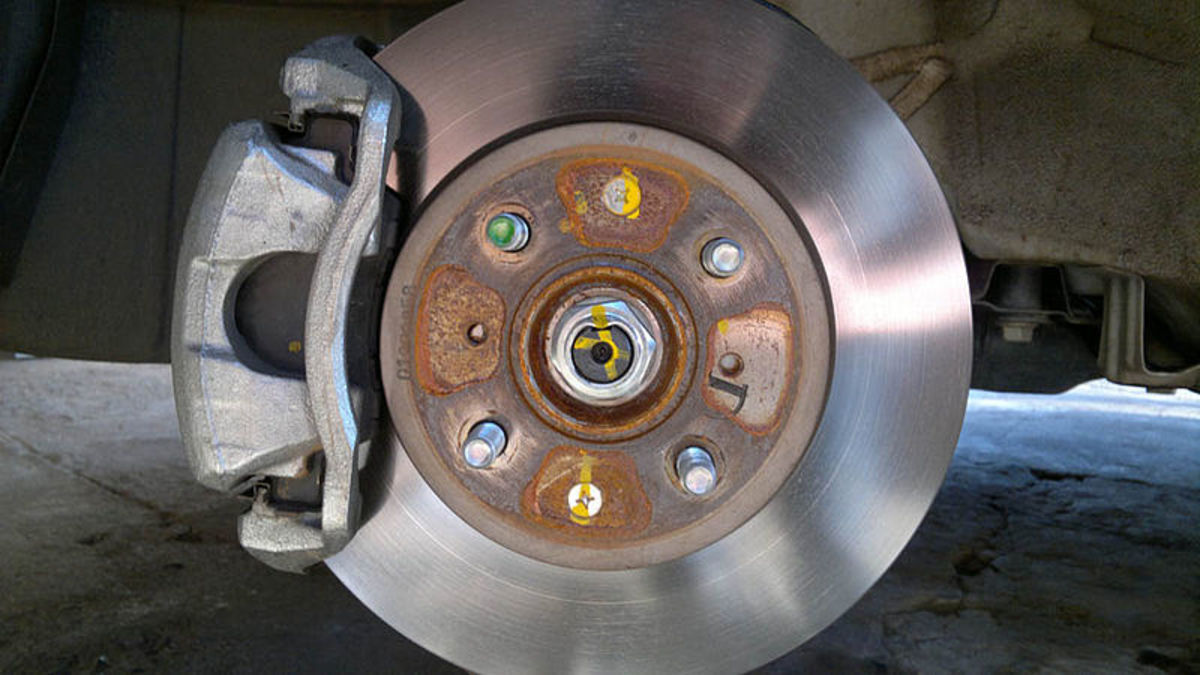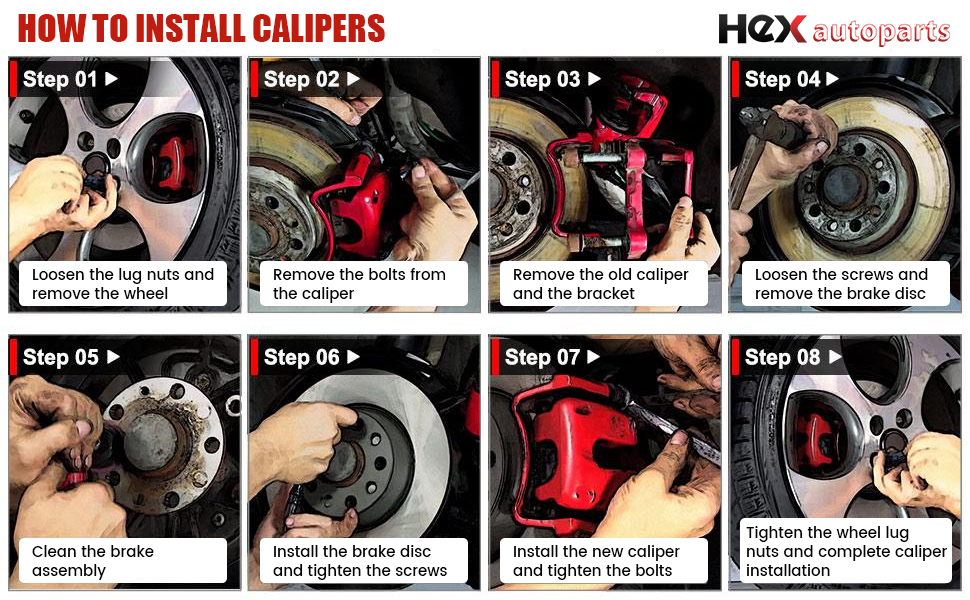Stunning Tips About How Do I Know If Calipers Need To Be Replaced

Brake Caliper Quandaries
1. Identifying Caliper Issues
So, your trusty steed, your car, is starting to act a little...off. Maybe it's pulling to one side when you brake, or perhaps there's a symphony of squealing coming from your wheels. These could be hints that your brake calipers, those unsung heroes of stopping power, are singing their swan song. Figuring out "how do I know if calipers need to be replaced?" isn't rocket science, but it does require a bit of detective work. This article will serve as your magnifying glass, guiding you through the process.
The caliper is the part of your braking system that squeezes the brake pads against the rotor to stop your car. It's a crucial component, and a failing caliper can significantly compromise your safety. Ignoring the warning signs can lead to more expensive repairs down the road, or worse, a dangerous driving situation. That's why staying informed is key. We're not talking about predicting the future here, but more like understanding the language your car speaks— squeaks, pulls, and all.
Think of your car like a chatty friend. It will often drop subtle hints before outright shouting. These hints might come in the form of uneven brake pad wear, where one side of your rotor seems to have more friction than the other. Or perhaps you've noticed a significant decrease in your car's braking performance? Did you recently make a quick stop and notice a burning smell coming from one of the wheels? Any of these signs should prompt you to take a closer look at your braking system.
Let's be clear: we're not suggesting you become a master mechanic overnight. However, arming yourself with some basic knowledge can empower you to make informed decisions about your car's maintenance. You might be able to identify a potential problem early on and save yourself a hefty repair bill. Or, at the very least, you'll be able to have a more informed conversation with your mechanic, ensuring that you're getting the right service for your vehicle.
:max_bytes(150000):strip_icc()/GettyImages-184974687-599f0d91d088c00011d6891f.jpg)
Worthygaret Blog
Spotting the Signs
2. Visual Clues and Performance Issues
Okay, let's dive deeper into the potential warning signs that indicate your calipers might be on their way out. Remember, it's about paying attention to the details. One of the most obvious signs is a brake fluid leak. Calipers use hydraulic pressure to function, and if there's a leak, that pressure will be compromised. Check around the calipers themselves and on the inside of your wheels for any signs of fluid. Brake fluid typically looks like a light amber or honey color.
Another telltale sign is a stuck caliper. This usually manifests as the car pulling to one side when braking, or a noticeable decrease in fuel efficiency because one wheel is constantly dragging. You might also notice excessive heat radiating from a particular wheel after driving. A stuck caliper can cause the brake pads to wear down prematurely on one side of the car, while the other side remains relatively intact. It's like having one stubborn foot on the brake pedal all the time!
Uneven brake pad wear, as mentioned before, is another important indicator. If you notice that one set of brake pads is significantly thinner than the other, it could be a sign that the caliper on that side is not functioning properly. Ideally, brake pads should wear down evenly over time. If there is a huge disparity between the two, this is a sure sign that there is a problem. Don't just ignore this warning sign and let it become a bigger and potentially dangerous problem!
Finally, listen to your brakes. A squealing or grinding noise when braking can indicate worn brake pads, but it can also be a sign of a problem with the caliper. Sometimes, a caliper piston can become corroded or damaged, causing it to stick and create unwanted friction. If you are experiencing these types of noises while applying your brakes, you should take your car to a mechanic right away to have it inspected and potentially have those calipers replaced.

The Nitty-Gritty
3. Taking a Closer Look
If you're feeling adventurous and have a bit of mechanical inclination, you can perform a visual inspection of your calipers. First and foremost, safety first! Make sure your car is parked on a level surface, the parking brake is engaged, and you've chocked the wheels for added security. You'll need to remove the wheel to get a good look at the caliper.
Once the wheel is off, inspect the caliper body for any signs of damage, such as cracks, dents, or corrosion. Look closely at the brake hose connection to the caliper for any leaks. Carefully examine the caliper piston boot (the rubber covering around the piston) for tears or damage. A damaged boot can allow dirt and moisture to enter the caliper, leading to corrosion and eventual failure. Remember, we're looking for anything that deviates from the norm— anything that looks out of place or damaged.
While you're inspecting the caliper, take a look at the brake pads as well. Check their thickness and ensure they're wearing evenly. If you notice any significant differences in thickness between the inner and outer pads, or between the pads on different wheels, it could be a sign of a caliper issue. Also, make sure the brake pads are properly seated in the caliper and that the retaining clips are in place.
Sometimes, the problem might not be immediately obvious. You might need to manually compress the caliper piston to check its movement. This requires a special tool called a caliper piston compressor. If the piston is difficult to compress or doesn't move smoothly, it could be a sign of corrosion or damage inside the caliper. If you're not comfortable performing this task, it's best to leave it to a professional.

How Much Does It Cost To Replace Calipers
When to Throw in the Towel
4. Making the Call
So, you've done your homework, you've inspected the calipers, and you've identified a potential problem. Now comes the million-dollar question: should you repair or replace the calipers? The answer depends on the severity of the problem and your budget. In some cases, a simple repair might be sufficient, while in others, replacement is the only viable option. Let's weigh the options.
If the caliper is leaking brake fluid, has a damaged piston boot, or shows signs of significant corrosion, replacement is usually the best course of action. These types of problems are difficult to repair reliably, and attempting to do so could compromise your safety. Remember, brakes are not something to cut corners on.
In some cases, you might be able to rebuild the caliper by replacing the piston, seals, and boots. This can be a more cost-effective option than replacing the entire caliper, but it requires a certain level of mechanical skill and experience. If you're not comfortable performing this type of repair, it's best to leave it to a professional. Furthermore, rebuilding calipers may not always be possible depending on the make and model of your vehicle.
Ultimately, the decision to repair or replace your calipers should be made in consultation with a qualified mechanic. They can properly diagnose the problem and recommend the best course of action based on your specific situation. Don't hesitate to get a second opinion if you're not comfortable with the mechanic's recommendation. Safety should always be your top priority.

How To Change Caliper Without Bleeding Brakes At Jerry Fagan Blog
Getting Professional Help
5. Seeking Professional Guidance
While it's great to be proactive and learn about your car's systems, there are times when it's best to call in the professionals. Dealing with brakes can be tricky, and messing something up can have serious consequences. Knowing your limits is key to ensuring your safety and the proper functioning of your vehicle. After all, we want to keep your car stopping smoothly, not just turning heads.
If you're not comfortable working on your car's brakes, or if you're not sure how to properly diagnose the problem, it's always best to take it to a qualified mechanic. They have the expertise, tools, and experience to properly inspect and repair your calipers. They can also advise you on whether to repair or replace the calipers, and ensure that the job is done safely and correctly.
Also, keep in mind that brake systems are interconnected. A problem with the calipers could be related to other issues, such as a faulty master cylinder, a clogged brake line, or a problem with the ABS system. A professional mechanic can diagnose these types of problems and make the necessary repairs to ensure that your entire braking system is functioning properly.
In the end, it's all about peace of mind. Knowing that your brakes are in good working order allows you to drive with confidence. So, don't hesitate to seek professional help when needed. It's an investment in your safety and the longevity of your vehicle. It's better to be safe than sorry when it comes to brakes. And remember, sometimes, the best way to fix something is to know when to ask for help!

FAQ
6. Quick Answers to Common Questions
Q: How long do brake calipers typically last?A: It varies depending on driving habits, environment, and the quality of the calipers themselves. Generally, they can last anywhere from 75,000 to 100,000 miles or more. However, it's crucial to inspect them regularly for any signs of wear or damage.
Q: Can I replace just one caliper if only one is bad?A: While you can replace just one, it's generally recommended to replace calipers in pairs (both front or both rear) to ensure even braking performance. This helps prevent uneven wear on your brake pads and rotors.
Q: How much does it cost to replace brake calipers?A: The cost can vary depending on the make and model of your car, the type of calipers, and the labor rates in your area. Expect to pay anywhere from $300 to $800 or more per caliper, including parts and labor. Always get a quote from a reputable mechanic before proceeding with the repair.
Q: What does caliper part of speech?A: Noun